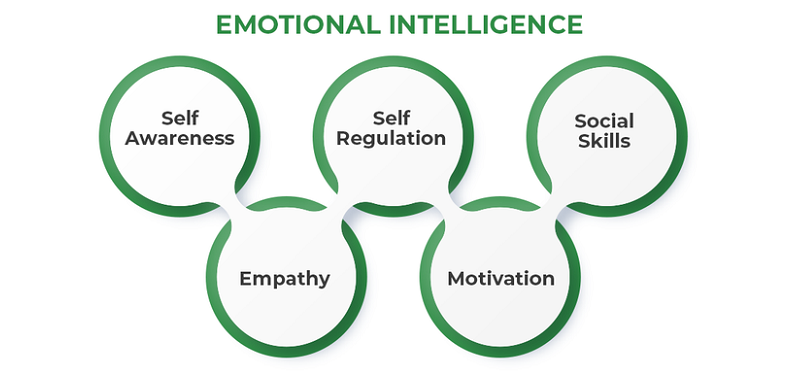
In today’s fast-paced and interconnected world, career success is often measured not just by technical skills and knowledge, but also by one’s ability to navigate the complex web of human emotions. Enter the realm of Emotional Intelligence (EI) – a powerful, often underrated tool that can propel individuals to new heights in their professional journey.
Emotional Intelligence, at its core, is the ability to perceive, understand, manage, and use emotions effectively – both our own and those of others. Far from being a soft skill, EI is a critical component that enhances decision-making, leadership, teamwork, and adaptability in the ever-evolving workplace landscape. By exploring its key components – self-awareness, self-regulation, motivation, empathy, and social skills – we uncover the secret sauce to thriving in a career, regardless of the industry or role.
Contents
The Components of Emotional Intelligence (EI)
Emotional Intelligence (EI) is not a monolithic concept; it’s a multifaceted skill set that encompasses various abilities, all essential for understanding and managing emotions effectively. The framework of EI is built upon five core components, each playing a vital role in how we perceive, interact with, and react to the world around us. These components are critical not only for personal well-being but also for achieving professional excellence.
Self-Awareness
Self-awareness is the foundational block of Emotional Intelligence. It involves an acute understanding of one’s emotions, strengths, weaknesses, and drives. This introspection helps in recognizing how our emotions affect our thoughts and behaviors, and how they, in turn, impact others.
Understanding One’s Emotions
Emotions can be complex, but the ability to identify and understand them is crucial. It’s about being aware of what you’re feeling and why. This understanding enables professionals to make more informed decisions, stay in control during challenging situations, and maintain a clear perspective.
Recognizing Personal Strengths and Weaknesses
Knowing what you’re good at and where you need improvement is essential in a professional setting. This self-knowledge allows individuals to leverage their strengths and work on their weaknesses, fostering personal growth and better career outcomes.
Self-Regulation
Following the awareness of one’s emotions, the next step is learning to control and regulate them. Self-regulation refers to managing disruptive emotions and impulses, and adapting to changing circumstances.
Managing Emotions
Being able to keep disruptive emotions and impulses in check is a sign of high EI. For instance, the ability to remain calm and clear-headed under stress is invaluable in the workplace [1].
Adapting to Change
Change is constant in the professional world. Those who can adapt their emotions to these changes demonstrate resilience and a capacity for growth, which are crucial for career advancement.
Motivation
Intrinsic motivation, a key component of EI, refers to being driven to achieve for the sake of achievement. This aspect of EI is essential for setting and attaining career goals.
Personal Drive and Ambition
A high level of EI is often characterized by a strong drive to achieve goals, even in the face of adversity. This drive keeps individuals focused and undeterred by setbacks.
Commitment to Goals
Emotionally intelligent individuals are not just motivated but also remain committed to their goals. This long-term focus is critical for career success and growth.
Empathy
Empathy, or the ability to understand and share the feelings of others, is a core component of EI. It’s particularly important in managing relationships, both within and outside the workplace.
Understanding Others’ Emotions
Being empathetic in the workplace means being able to sense and understand the emotions of colleagues and clients. This understanding can lead to better communication and stronger professional relationships.
Developing Compassion
Empathy goes beyond understanding emotions; it’s about actively expressing compassion. This ability fosters an environment of trust and respect, which is essential for effective teamwork and leadership.
Social Skills
Lastly, social skills are an integral part of EI. They involve the ability to manage relationships and build networks, an essential ability for career success.
Communication Abilities
Good social skills include effective communication, the ability to listen, and being clear and articulate. These skills are essential for collaboration, conflict resolution, and leadership [2].
Building Relationships
The ability to build and maintain relationships is a cornerstone of professional success. Emotionally intelligent individuals excel at creating and nurturing these connections, which can lead to more opportunities and better career outcomes.

Emotional Intelligence (EI) in the Workplace
The application of Emotional Intelligence (EI) in the workplace cannot be overstated. It goes beyond personal benefits, significantly impacting the overall dynamics, culture, and success of an organization.
Importance of EI for Team Dynamics
In any professional environment, the ability to work effectively within a team is invaluable. EI plays a pivotal role in fostering healthy team dynamics. Teams with members high in EI tend to have better communication, a more collaborative spirit, and a stronger sense of mutual respect. Such environments are conducive to creativity, productivity, and overall job satisfaction.
Emotionally intelligent team members are adept at recognizing and understanding not only their own emotions but also those of their colleagues. This awareness leads to more empathetic interactions and a more inclusive team atmosphere. Furthermore, EI aids in navigating the complexities of team relationships, making it easier to resolve conflicts, share constructive feedback, and work towards common goals harmoniously [3].
EI’s Role in Leadership
Leadership is significantly more than just managing tasks and people; it’s about inspiring, influencing, and guiding others towards a shared vision. Here, EI becomes a crucial component of effective leadership. Leaders with high EI are better equipped to understand and manage their own emotions and those of their team members. They are capable of creating an emotional connection with their employees, which can lead to increased loyalty and motivation.
Such leaders are also adept at handling stress and uncertainty, often remaining calm and composed in challenging situations. Their empathetic nature allows them to understand and address the needs and concerns of their employees, fostering a supportive and understanding work culture. This approach not only enhances employee satisfaction but also drives higher performance and productivity.
EI and Conflict Resolution
Conflict is an inevitable part of any workplace. However, the way conflicts are managed can significantly affect the work environment and outcomes. EI is a key factor in effective conflict resolution. Individuals high in EI can approach conflicts with a level of empathy and understanding, viewing them as opportunities for growth rather than threats.
These individuals are skilled at de-escalating tensions, recognizing and validating different perspectives, and finding common ground. Their ability to manage their own emotions and understand others’ feelings helps them to navigate conflicts in a way that minimizes damage and fosters a constructive resolution. By resolving conflicts effectively, they help maintain a positive work environment, which is essential for the well-being and productivity of the team.

Developing Emotional Intelligence (EI)
While some individuals may naturally possess higher levels of Emotional Intelligence (EI), the encouraging news is that EI can be developed and enhanced over time.
Self-Assessment and Feedback
The journey to developing EI begins with self-awareness, and self-assessment is a critical tool in this process. It involves taking an honest look at oneself to understand current EI levels, identifying areas of strength and those needing improvement. Various tools and assessments can aid in this self-evaluation, including EI questionnaires and feedback mechanisms.
Receiving feedback from others, such as colleagues, managers, or mentors, is also invaluable. This external perspective can provide insights into how one’s emotional behavior is perceived by others, highlighting areas for growth that might not be self-evident.
Strategies for Enhancing EI Components
Once areas for development are identified, the next step is to work on enhancing specific components of EI. This can be achieved through various strategies and exercises tailored to individual needs and situations.
Mindfulness Practices
Mindfulness is a powerful tool for increasing self-awareness and self-regulation. Practices such as meditation, reflective journaling, or simply taking time to pause and observe one’s thoughts and feelings can help individuals become more attuned to their emotional state. This heightened awareness is a crucial first step in managing emotions more effectively [4].
Emotional Literacy Exercises
Developing emotional literacy involves improving one’s ability to recognize and articulate emotions. Exercises like naming emotions as they occur, exploring their triggers, and expressing feelings in a constructive manner can enhance one’s understanding and communication of emotions. This skill is particularly useful in empathizing with others and managing social interactions.
The Role of Continuous Learning and Adaptation
Developing EI is not a one-time effort but a continuous process of learning and adaptation. As individuals progress in their careers and encounter new challenges and environments, their EI skills need to evolve accordingly. This involves staying open to new experiences, learning from interactions, and being willing to adapt one’s emotional responses to different situations. Regular reflection on one’s experiences and emotions can provide valuable lessons and insights, aiding in the ongoing development of EI.
Emotional Intelligence (EI) and Career Advancement
The correlation between Emotional Intelligence (EI) and career advancement is increasingly recognized in the modern workplace. Professionals who exhibit high levels of EI are often more successful in navigating the complexities of their careers.
EI as a Predictor of Professional Success
Emotional Intelligence is increasingly viewed as a key indicator of professional success, often surpassing technical abilities or IQ [5]. In diverse career fields, from entry-level positions to executive roles, EI plays a crucial role in several aspects:
- Leadership Opportunities: Individuals with high EI are often natural leaders. They possess the ability to understand and manage not just their emotions but also those of their team, making them effective and empathetic leaders.
- Building Professional Relationships: EI aids in forming and maintaining strong professional relationships, which can open doors to new opportunities, collaborations, and advancements.
- Navigating Workplace Challenges: The ability to manage emotions and remain composed under pressure is invaluable in dealing with workplace challenges, making emotionally intelligent individuals more adaptable and resilient.
- Effective Communication and Negotiation: High EI is associated with better communication and negotiation skills, essential for advancing in any career.
These facets demonstrate that EI is not just a beneficial trait but a fundamental component for career advancement.
Integrating EI into Career Development Plans
Understanding the importance of EI is one thing; actively integrating it into one’s career development plan is another. Professionals seeking to advance their careers should consider the following steps:
- Set Specific EI Goals: Just like any skill, EI can be developed with intention and practice. Setting specific, measurable goals for improving EI can lead to significant progress.
- Seek Opportunities for EI Growth: This might involve taking on roles that require high levels of interaction, empathy, or leadership, such as managing a team or leading a project.
- Continuous Learning and Training: Engaging in workshops, seminars, and training focused on developing EI skills can provide both theoretical knowledge and practical applications.
- Reflection and Adaptation: Regular reflection on one’s experiences and feedback can facilitate ongoing EI development, helping to adapt and grow in response to new challenges and opportunities.
References
[1] The Contribution of Emotional Intelligence to Career Success: Beyond Personality Traits
[2] Why emotional intelligence makes you more successful
[3] How Developing Your Emotional Intelligence Supports Career Advancement
[4] How emotional intelligence affects work success
[5] Long term impact of emotional, social and cognitive intelligence competencies
